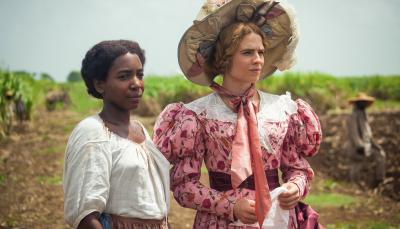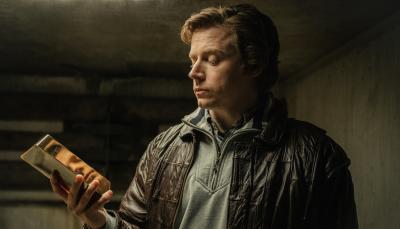'The Pembrokeshire Murders' is Straightforward, Workmanlike True Crime Drama
WORLD PRODUCTIONS FOR ITV THE PEMBROKESHIRE MURDERS EPISODE 1 Pictured: LUKE EVANS as Steve Wilkins. This photograph must not be syndicated to any other company, publication or website, or permanently archived, without the express written permission of ITV Picture Desk. Full Terms and conditions are available on www.itv.com/presscentre/itvpictures/terms For further information please contact: Patrick.smith@itv.com 07909906963
WORLD PRODUCTIONS/ITV
Though the new Britbox drama The Pembrokeshire Murders centers around a case that few Americans will likely be very familiar with, this ITV import is a show that dedicated true crime fans will know right down to its bones.
Now, that's not necessarily a bad thing. But if you're looking for shocking twists or a heart-pounding race to suss out a killer before he strikes again, you generally won't find that here. Instead, this is a story about the triumph of dogged police work, the drudgery of paperwork, and the amazing advances that have occurred in the field of forensics over the past few decades.
The series is based on the real-life murders of Peter and Gwenda Dixon a couple who were robbed and shot dead on a coastal path in Pembrokeshire in 1989. Their killer, a man named John Cooper, also turned out to be responsible for a string of other robberies, rapes, and murders, and the only real tension in the show has little to do with the likelihood of his guilt (the camera frames Keith Allen ominously the minute he steps onscreen), but whether or not he will be held responsible for his (apparently many) crimes.
Evans plays DCS Steve Wilkins, a detective who begins to draw connections between multiple unsolved murders in the region and then, in turn, to connect them to Cooper, already in prison and serving 16 years for robbery. The question is whether they'll be able to put the evidentiary pieces together to prove his involvement in time to prevent his getting out on parole - and likely killing again.
Unlike the Sundance Now series Des, which faces a similar problem of how to build a compelling story around a murder that is essentially solved in the show's opening moments, The Pembrokeshire Murders doesn't spend a terrible amount of time on the monster at its center. Cooper appears several times throughout the series and Allan's performance is solid in every respect - a nasty, shambling piece of work with a terrified wife and a tragic story surrounding his son. But he's far from the series' focal point.
Evans is a solid, workmanlike performer here, embodying his character's kind heart and meticulous nature in both his personal and professional lives. There are some vague subplots about divorced dad Wilkins attempting to reconnect with his children now that he's moved back to Wales and he seems generally well-meaning if something of a try-hard when it comes to his kids.
His dogged determination to see Cooper punished is both admirable and compelling, and the show doesn't shy away from showing us just how much hard work goes into bringing a man like this to justice. The drama perfectly captures the quiet, repetitive drudgery that often makes up the heart of good police work: Reading old files and then reading them again, going through evidence and witness testimony with a fine-tooth comb, staring at grainy crime scene photos looking for clues.
The painstaking precision used to draw connections between specific people at specific places in specific moments in time is honestly exhausting, and it's impossible not to think of all the cases that haven't and likely won't be solved because someone wasn't able to do the same things for those victims. The victory here isn't in winning a case or proving an argument, it's the fact that four dead people finally got something like justice. That's the thing worthy of celebration.
If The Pembrokeshire Murders has a significant flaw, it's that it doesn't give Cooper's victims enough of a voice. The show is respectful and careful in the way it discusses their deaths -- there are no bloody flashbacks and Cooper's behavior is not sensationalized in any way. But it doesn't bother to tell us much about who these people were or suggest that it - and by extension its audience - should remember them beyond being the victims of a sociopath.
But, in a media landscape that is often stuffed with exploitative and sensational true crime dramas and docuseries, this is an example of the genre done right, even when the story involved has a particularly shocking element. (Cooper's appearance on the game show Bullseye, just a short time after committing murder and mere weeks before he would do it again, feels like something plucked from the pages of a novel.) And that's certainly something to be applauded, even if the final product isn't perfect. (And isn't always as propulsive a viewing experience as some might like.)
Have you seen The Pembrokeshire Murders? Plan to give it a look? Let's discuss in the comments.



